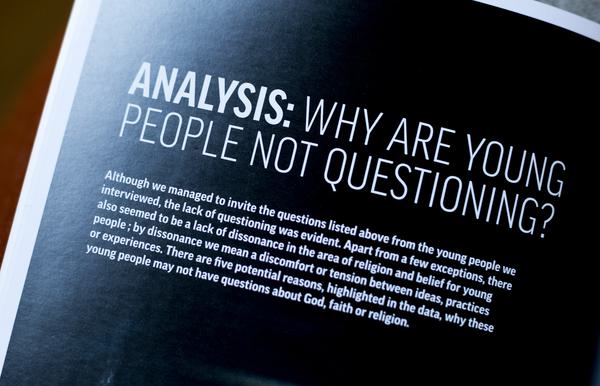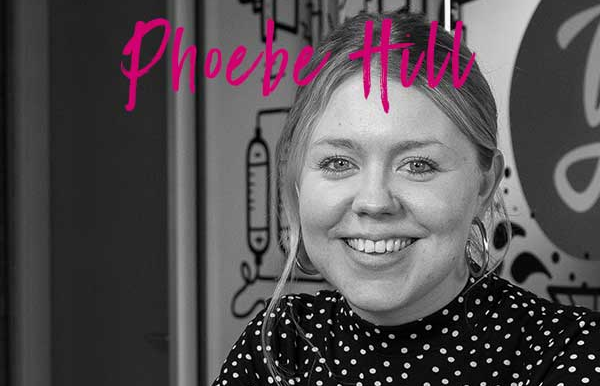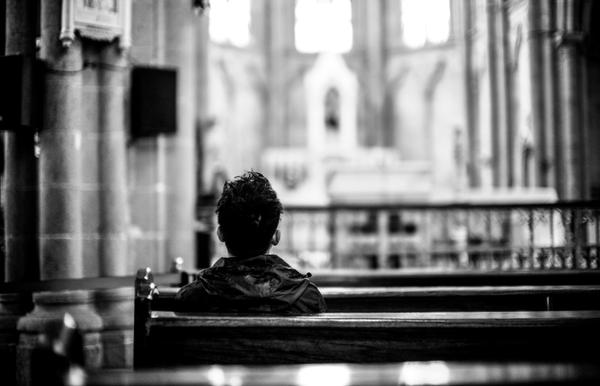Our 2017 report No Questions Asked found a lack of spiritual curiosity in young people. Head of Theology Phoebe Hill revisits the research to ask how its insights should shape youth work today.
Our intention, when beginning our No Questions Asked research, was to find out the questions that young people today are asking about faith and religion. What we discovered was much more interesting. Yes, the young people – when provoked – had some questions. But their questions were not forthcoming, and they did not seem particularly motivated to find out the answers. The questions were in some senses ‘improvised’ for the purpose of the interview, and to satisfy our questions to them. Our conclusion from the research is that although the young people presented with some religious or spiritual questions, they did not demonstrate spiritual or religious curiosity; curiosity involves motivation to seek out answers.
Despite this lack of curiosity, the young people’s interest in the conversation seemed to increase over the course of the interview. Some of the young people expressed how much they had enjoyed it afterwards, and asked if we would be coming back again next year. They were clearly not averse to talking about faith and spiritual matters once the conversation got going. Indeed, most of the young people were able to recount a ‘spiritual’ experience from their past and had prayed at some point in their lives. Often these moments had passed by without reflection.
cultivating curiosity through context
As with Smith and Denton’s study in the US, the interview seemed to be the first time that the young people were asked about what they believed, and the first time they were provided the opportunity to reflect on their past experiences.[1] In reflecting on these experiences, more questions began to spring up from the young people, ones that could be described as ‘tethered’ to their life experiences. The interview context itself therefore created an environment where questions were cultivated. The interview provided the opportunity, perhaps for the first time ever, for the young people to reflect on past experiences, which led to more questioning.
Our hunch is that, over time, exposure to safe contexts for questioning may stimulate curiosity. According to Leo Casey – writing from an educational perspective – curiosity can be fostered in environments with the following five characteristics:
“the religious contexts young people were part of often ‘dulled’ their curiosity by seeking to answer questions, rather than stimulate further questions.”
- where inquisitiveness is encouraged
- where a safe space is created
- where conceptual tools are provided
- where knowledge and experience is harnessed
- where peer discussion is facilitated.[2]
The remainder of this blog will explore the interview context itself as an incubator of religious and spiritual questioning, on account of encouraging an inquisitive stance, offering a safe space, providing conceptual tools and harnessing knowledge and experience. The one element from Casey’s list that the interviews lacked is peer discussion, something which, interestingly, youth groups often provide in abundance.
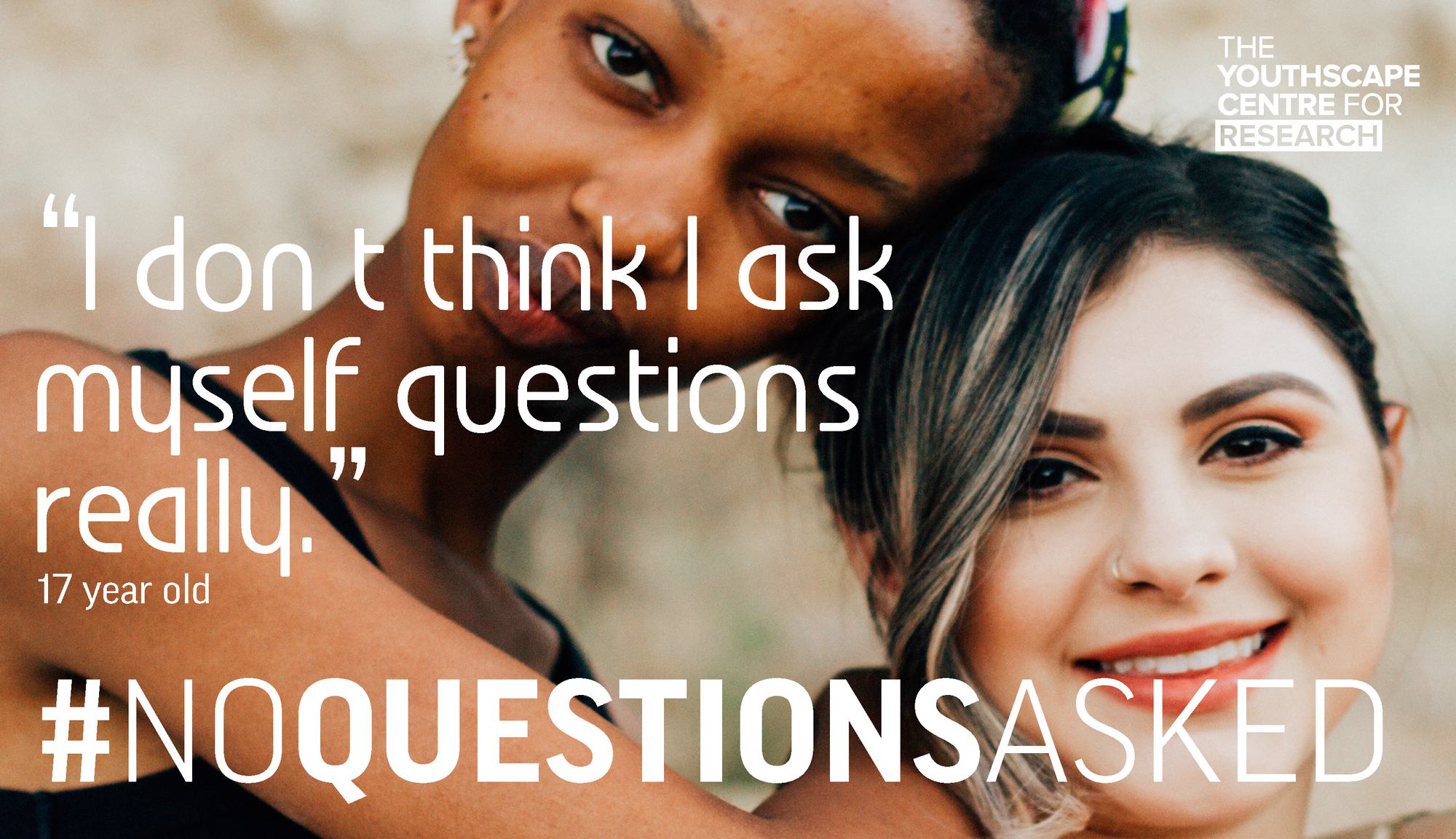
Encouraging an inquisitive stance
In each interview, it was explained to the young person that the interviewers were interested to know what they thought. As semi-structured interviews, no topic was completely off limits, and indeed one interview involved a lengthy discussion about Big Bang Theory (the TV show). It is questionable how many situations young people find themselves in where their thoughts are valued and taken as seriously as they are in an interview context. In this environment, and with its exclusive focus on religious and spiritual questions, adopting an inquisitive stance is encouraged. A challenging finding from our research was that the religious contexts young people were part of often ‘dulled’ their curiosity by seeking to answer questions, rather than stimulate further questions.
This raises the following challenge for those of us working with young people in faith contexts: are we genuinely seeking to encourage an inquisitive stance and provoke curiosity among young people with regard to faith, or simply to encourage questions so that we can offer answers?
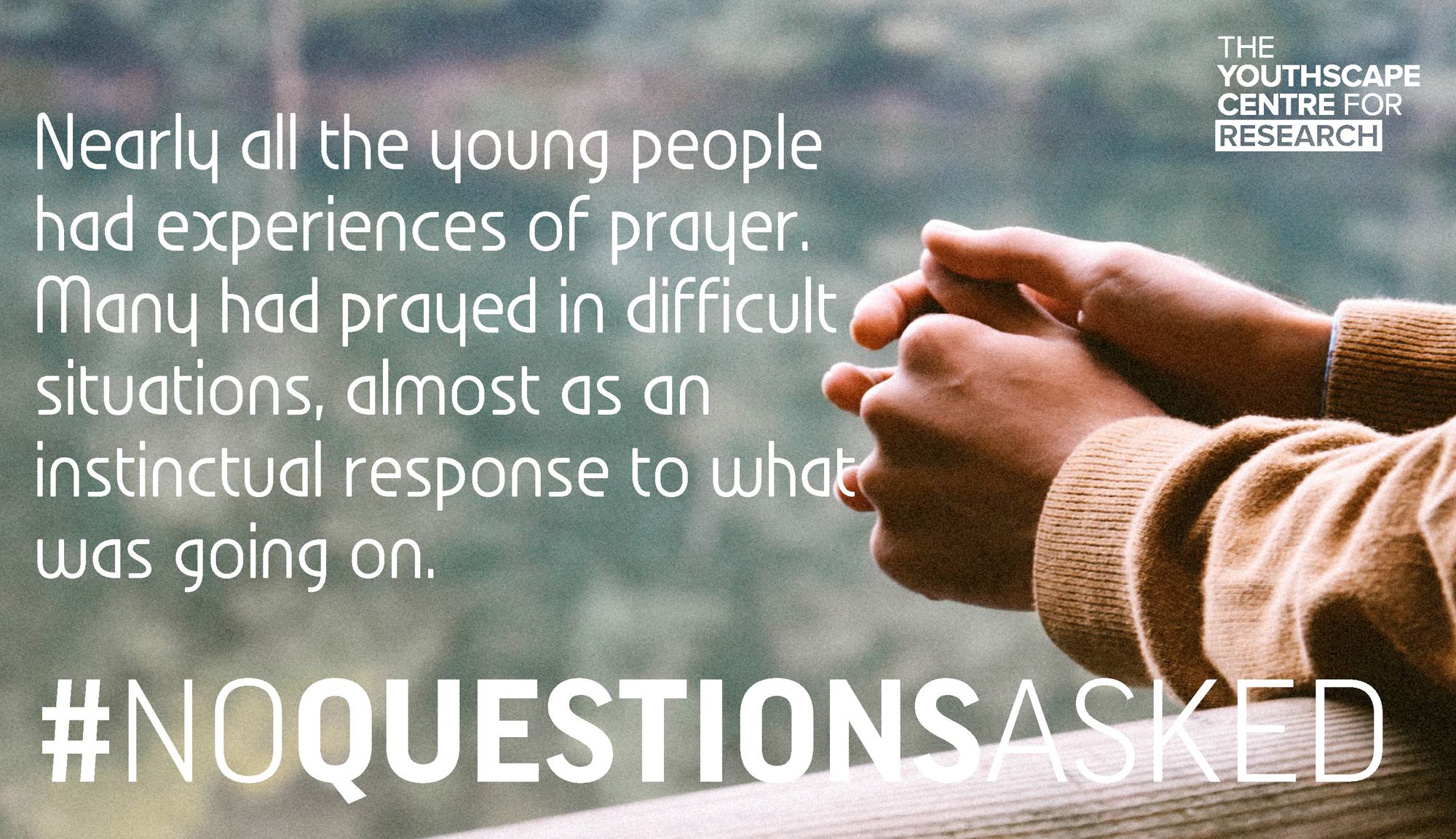
Creating a safe space
A safe space suggests a place free from judgement, where an individual feels able to express their thoughts without consequence. An interview is a privileged and unparalleled moment in this regard, and unique. Not all of the young people were able to experience the interview as a ‘safe space’. Some of the young people, however, did seem to find the interview to be a safe space, telling the interviewer things that they had never shared with anyone else before, not even friends or family.
This raises the following challenge for those of us working with young people in faith contexts: are our churches and youth groups experienced as safe spaces for questioning, where young people can ask their questions without fear of judgement, causing offence or sparking concern?
Providing conceptual tools to enable abstract thinking
Several ‘conceptual tools’ were incorporated into the interview to facilitate abstract thinking and questioning. As Casey explains, young people may have never been encouraged to be inquisitive – in this case about religious or spiritual things – and therefore may need help to learn how to begin.[3] The first conceptual tool included in the interview was a ranking exercise, to open up conversation. Next, four ‘big’ questions were presented to the young person on cards, which would guide the majority of the conversation (e.g. What do you think about the idea that God or gods exist?). Finally, the young people were asked to assess how important the questions were for them, on a scale of 0-10.
“the interview seemed to be the first time that the young people were asked about what they believed, and the first time they were provided the opportunity to reflect on their past experiences.”
All of the above could be described as conceptual tools which sought to open up discussion, questioning and curiosity around the topics of religion and spirituality. On reflection, more tools could have been provided to help the young people think abstractly. Given that some of the young people had little exposure to discussions around religion or spirituality, and lacked a frame of reference, it might have worked well to provide a frame – through a text, moral scenario, role play or creative activity – to give them something concrete to respond to.
This raises the following challenge for those of us working with young people in faith contexts: do we expect young people to have questions, without any impetus or help? What might the appropriate ‘conceptual tools’ in a youth group scenario be, to facilitate abstract thinking and questioning among the young people?
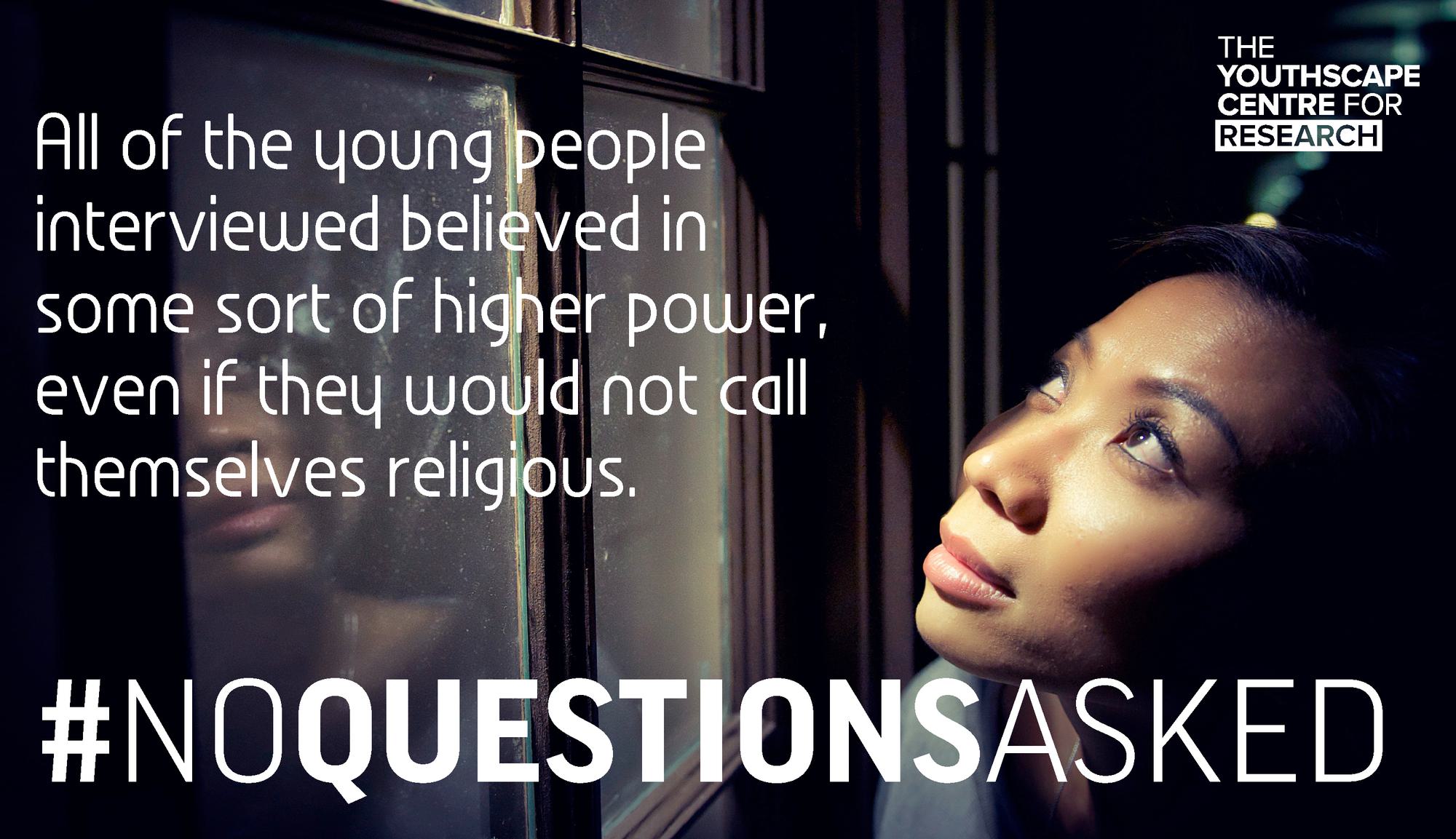
Harnessing existing knowledge and experience
Despite the lack of surface level questioning, many of the young people interviewed did have religious or spiritual experiences – such as moments of awe and wonder, or praying when a loved one died – which they had never reflected on before. They wouldn’t necessarily have considered these moments to be ‘spiritual’ or particularly significant. It was almost as if these experiences were unearthed over the course of the interview, as in some cases the young people had forgotten about them, or hadn’t reflected on them since they had occurred.[4] Given the opportunity to reflect on past experiences, the interview was a moment to gather together the sum of religious and spiritual encounters, moments, practices, and conversations, and consider what they might mean.
This raises the following challenge for those of us working with young people in faith contexts: how might we harness young people’s existing experiences, and bring them to mind where they may have been forgotten? Are our youth groups places of two-way dialogue, encouraging young people to contribute their own experiences and stories and building on these for learning?
It may be possible, through application of these principles for cultivating questions, and through increased exposure to safe and encouraging environments for questioning, to cultivate religious and spiritual curiosity; youth groups and schools-based ministries could well offer an ideal context for this.
CITATIONS
This article summarises key points from Phoebe Hill’s article published in the Journal of Youth and Theology, ‘I don’t think I ask questions really’, which you can find here.
[1] Christian Smith and Melinda Lundquist Denton, Soul Searching: The Religious and Spiritual Lives of American Teenagers (Oxford: Oxford University Press, 2005).
[2] Leo Casey, "Questions, Curiosity and the Inquiry Cycle," E-Learning and Digital Media 11, no. 5 (2014): 512.
[3] Casey, “Questions, Curiosity and the Inquiry Cycle.”
[4] This is reminiscent of Phil Rankin’s research and conclusion that young people’s spirituality is ‘buried’, see Phil Rankin, Buried Spirituality: A Report on the Findings of the Fellowship in the Spirituality of Young People Based at Sarum College, Salisbury (Salisbury: Sarum College Press, 2005).




